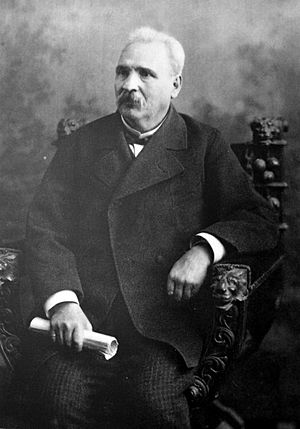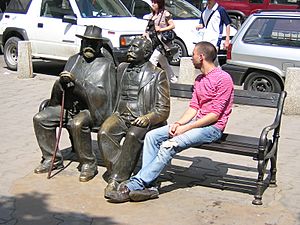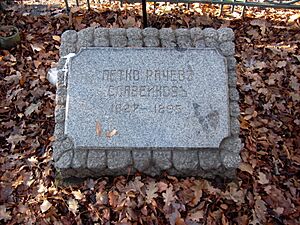Petko Slaveykov facts for kids
Quick facts for kids
Petko Slaveykov
|
|
|---|---|
 |
|
| Born | 17 November 1827 Tarnovo, Ottoman Empire
|
| Died | 1 July 1895 (aged 67) |
| Resting place | Central Sofia Cemetery |
| Occupation | Poet, Publicist, Politician |
| Spouse(s) | Irina Raykova |
| Children | Pencho Slaveykov |
Petko Rachov Slaveykov (Bulgarian: Петко Рачов Славейков) was an important Bulgarian poet, a writer who shared his opinions (called a publicist), a politician, and someone who studied folk traditions (a folklorist). He was born on November 17, 1827, and passed away on July 1, 1895.
Contents
Biography
Early Life and Education
Petko Slaveykov was born in Tarnovo. His father, Racho, was a coppersmith. Petko's family had moved to Tarnovo from other parts of Bulgaria. Sadly, his mother, Penka, died when he was born, but Petko survived.
He got his last name, Slaveykov, in a special way. When he was young, he visited his mother's village, Vishovgrad. There, he saw many nightingales, which are called slavey in Bulgarian. He was so impressed that he decided to change his family name to Slaveykov.
Petko studied in several towns like Tarnovo, Dryanovo, and Tryavna. He also taught himself by reading many books in monastery libraries. He read an important book called Istoriya Slavyanobolgarskaya by Paisius of Hilendar. Later, he learned more Greek and read books from Western Europe and Serbia.
In 1843, Slaveykov became a teacher in his hometown. However, he was sent away because of a funny poem he wrote. After that, he taught in many different towns across Bulgaria. He used a teaching method called the Bell-Lancaster method, which helped many students learn at once. He also kept learning himself. In the town of Elena, he taught at a special school he called Daskalolivnitsata, which means "the Teacher Moulder."
Cultural Work and Time in Istanbul
Petko Slaveykov was very active in Bulgarian culture and education. By 1847, he had collected over 2,200 folk songs, sayings, and proverbs. He started printing his first books in 1852.
In 1853, he wrote a poem called Boyka voyvoda, inspired by the Crimean War. He also wrote many songs that encouraged people to fight for freedom. After a failed uprising in Tarnovo in 1856, Slaveykov focused on helping Bulgarians feel proud of their national identity.
He moved to Istanbul in 1864. There, he was asked to help edit a full Bulgarian translation of the Bible. This translation was finished in 1871 and was very important. It helped establish the East Bulgarian dialect as the main language for Bulgarians.
While in Istanbul, Slaveykov published many newspapers and magazines, like Gayda and Makedoniya. He became one of the most famous Bulgarian writers in Istanbul, publishing over 60 books, newspapers, and magazines. He also took part in the fight for an independent Bulgarian church, which led to the creation of the Bulgarian Exarchate. He was even arrested once because of an article he wrote in the Makedoniya newspaper.
Revolutionary and Political Activity
In 1873, Slaveykov wrote his famous poem Izvorat na Belonogata ("The Spring of the White-Legged"). In 1874, he founded a Bulgarian high school in Odrin. He worked to keep Bulgarian culture strong against Greek influences there.
Later, while teaching in Stara Zagora, Slaveykov wrote poems that encouraged revolution. He was arrested and imprisoned after the April Uprising. During an Ottoman attack on Stara Zagora, his writings and 15,000 collected folk sayings were sadly burned and lost.
After Russian forces freed him during the Russo-Turkish War of 1877-78, he worked closely with them. He even guided a Russian general's army through the Balkan Mountains. He saw the Battle of Shipka and traveled with the army to San Stefano.
After Bulgaria gained its freedom from Ottoman rule in 1878, Slaveykov became a politician. He worked with Petko Karavelov to create a democratic constitution. He became a member of the first Grand National Assembly. In 1880, he became the Chairman of the National Assembly of Bulgaria. He also served as a Minister, in charge of Education and Internal Affairs. He continued to publish newspapers like Nezavisimost (meaning "Independence").
Because of his strong democratic ideas and his involvement in politics, he was arrested again. He was also forbidden from teaching, and his pension (money he received after retirement) was reduced. Petko Slaveykov passed away on July 1, 1895, in Sofia.
Petko Slaveykov had eight children. Some of them, like Ivan Slaveykov, Hristo Slaveykov, and Pencho Slaveykov, also became famous politicians or writers.
Works and Legacy
Petko Slaveykov greatly helped develop the Bulgarian language through his original writings and translations. He wrote patriotic songs and poems about love and nature. He was influenced by Russian poets like Aleksandr Pushkin. Some of his historical poems include Krumiada and Gergana.
He published two collections of folk songs and managed to restore about 17,000 collected proverbs after his original notes were lost. Besides being a poet, writer, and journalist, Slaveykov was also a translator and a language expert. He is considered the founder of Bulgarian children's literature and wrote textbooks. He also studied geography, history, and wrote biographies. He published a book called Balgarski pritchi, poslovitsi i harakterni dumi (Bulgarian Parables, Proverbs, and Characteristic Words). He researched Bulgarian customs, traditions, and psychology, and used many different pen names.
Honour
Slaveykov Peak, a mountain peak in Antarctica, is named after Petko Slaveykov to honor his contributions.
 | Chris Smalls |
 | Fred Hampton |
 | Ralph Abernathy |



